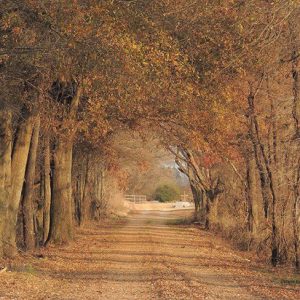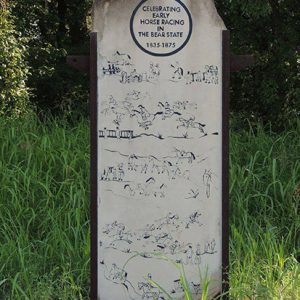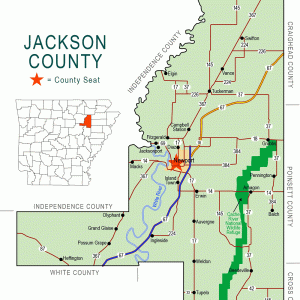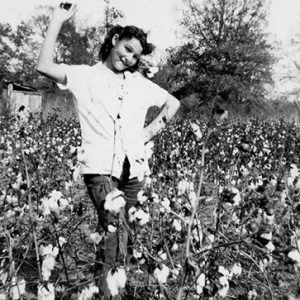calsfoundation@cals.org
Elgin (Jackson County)
Elgin is located on Jackson County Road 64 about six miles west-southwest of Tuckerman (Jackson County) and about three miles east-southeast of Cord (Independence County). Elgin lies in the Black River bottoms, excellent terrain for large productive farms, although devastating floods sometimes occur. The bridge on Highway 37 occasionally closes because of high water. The bottoms once grew mainly cotton, but today soybeans and other crops dominate. Historically, Elgin was an important riverboat town, with its ferry being on the main road between Batesville (Independence County) and Jacksonport (Jackson County), about eight and a half miles south of the confluence of the Black and White rivers.
Elgin was the name of a 3,000-acre plantation in the Black River bottoms owned by Robert T. Dunbar, who began ferry service across the river in 1832. Robert Dunbar was the son of scientist and planter William Dunbar who, along with physician George Hunter, had been assigned by President Thomas Jefferson to explore parts of the newly purchased Louisiana Territory between 1804 and 1807. The Hunter and Dunbar Expedition reported many encounters with European trappers, hunters, planters, and settlers as well as fellow river travelers plying the waters of the Red, Black, and Ouachita rivers. Robert Dunbar was born on his father’s Forest Plantation in Natchez, Mississippi, and established his plantation on the Black River shortly after his marriage to Elizabeth Holmes in 1832. He named his Black River estate Elgin in honor of his father, as Elgin was the location of the Dunbar family estate in William Dunbar’s native Scotland.
Robert Dunbar died childless in 1840. The plantation, which included 1,000 acres across the river that were once part of the Tunstall Plantation, was bought by steamboat captain James S. Smith. The Elgin post office was established in 1857 with Smith as the first postmaster; it operated until 1901.
During the Civil War, on January 15, 1864, a Union scouting expedition out of Batesville, headed by Second Lieutenant A. N. Harris of Company K, Eleventh Missouri Cavalry, with a company of forty men had orders to seize a herd of beef cattle grazing in the canebrakes along Black River near Elgin. The captain described: “The land for several miles is very good, the best tract of land I have seen in the State: good farms, good timber and soil: well adapted to the growth of corn and cotton.” At Elgin Ferry across Black River from Elgin, a party of secessionists was camped. A parley took place, and it was discovered that the cattle had been driven elsewhere and had to be rounded up. Ultimately, twenty-one cows and four prisoners were returned to Batesville.
Following the Civil War, plantation owners in Elgin, as elsewhere, practiced sharecropping and tenant farming. The Elgin Ferry was referred to as the Smith Ferry during this time. In 1873, Edmund James Taylor purchased the Elgin plantation. The Taylor family continued to operate the Elgin Ferry until it was closed in 1979. Other large farms in the Elgin area included one owned by the McDonald family. Elgin had a company store for the farm workers on the road going to Tuckerman. There were two other stores, one called Washington’s Store, and the other known as the Rolling Store.
One successful farmer of Elgin was Nicholas Wesley (Wes) Bengel, whose parents migrated from what is now Germany to the United States during the Revolutions of 1848 in Europe. Wes Bengel was born in 1865 in Indiana. A skilled entrepreneur, he ended up in Elgin, eventually investing in land in Elgin, Jamestown (Independence County), and elsewhere. Several members of the family are buried in the Waters Cemetery at Elgin, and one of his descendants still owns much of the land in Elgin.
The town of Elgin began losing population when Arkansas Highway 37 was extended from Tuckerman to Cord between 1940 and 1945, bypassing Elgin. The bridge across the Black River superseded the historic Elgin Ferry. Soybeans and other crops soon replaced cotton as the staple agricultural product in the bottomland. Mechanized farming methods in the 1960s and 1970s eliminated the need for a large number of field workers. The school at Elgin was annexed by the Tuckerman School District in 1944. Elgin Landmark Church, however, is still active.
The Black River at Elgin is a demarcation line between the “dry” Independence County and the “wet” Jackson County, where it is legal to sell alcohol. At the crossroads of Jackson County Road 64 and Highway 37, just across the bridge and a short distance south of Elgin, are three liquor stores. These are the only businesses in twenty-first-century Elgin.
For additional information:
Berry, Trey, Pam Beasley, and Jeanne Clements, eds. The Forgotten Expedition: The Louisiana Purchase Journals of Dunbar and Hunter, 1804–1805. Baton Rouge: Louisiana State University Press, 2006.
Bocklage, Judy. “2-Lane Bridge across the Black River May Force Elgin Ferry to Retire.” Arkansas Gazette, July 19, 1978.
Christ, Mark K. ‘Our First Whiff of Gunpowder’: The Skirmish at Orient Ferry, July 8, 1862.” Independence County Chronicle 53 (Summer 2012): 16–22.
Forester, R. K. “Bob.” “Elgin, the Ferry and Postal Service.” Independence County Chronicle 3 (January 1962): 43–46.
Masterson, Mike. “Elgin Ferry Kept in Same Family Since Birth 98 Years Ago.” Arkansas Gazette Sunday Magazine, September, 17, 1971, p. 4A.
McNeilly, Donald P. The Old South Frontier: Cotton Plantations and the Formation of Arkansas Society, 1819–1861. Fayetteville: University of Arkansas Press, 2000.
Kenneth Rorie
Buren, Arkansas
 Cheshier Cemetery
Cheshier Cemetery  Horse Racing Marker
Horse Racing Marker  Jackson County Map
Jackson County Map  Kathryn Stoner
Kathryn Stoner 



Comments
No comments on this entry yet.